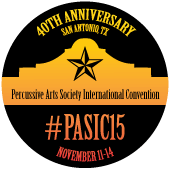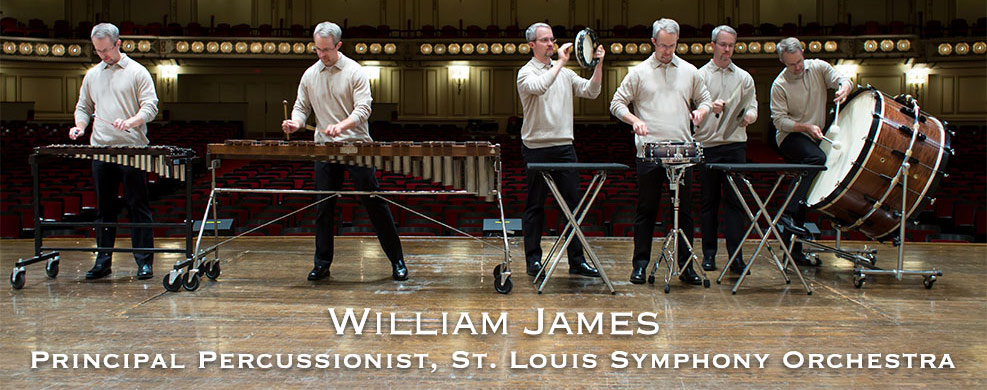I could not be more pumped to attend PASIC this year in San Antonio! There are a ton of great clinics, masterclasses, and performances to look forward to. Not mention a great city to host it! The only problem I think I’m going to have is how to replicate myself so I can attend everything I want as well as eat, sleep, and hit the exhibition hall! Let’s get to it, here are my PASIC picks!

Thursday
8:00 am – Symphonic Committee Meeting
While I am not necessarily looking forward to the hour this is being held, it is always great to see everyone and discuss ideas for next year at PASIC and ideas for PAS in general.
11:00 am – Brian Del Signore – Symphonic Lab – Snare Drum
Brian is the Principal Percussionist and Associate Principal Timpanist in the Houston Symphony Orchestra. I’ve met Brian many times at PASIC and have been impressed with his playing and general symphonic knowledge. A great guy as well! I’m looking forward to watching him coach the students.
11:00 am – Northwestern University Percussion Ensemble
There is a soft spot in my heart for my alma mater and will definitely make it over to see them play!
1:00 pm – ME!!!! William James – Symphonic Lab – Mallets!!!!!!
Do the exclamation points make you want to attend?? I am very excited for the 4 students who are going to play in this lab. I am taking a slightly different approach this year to the Lab and focusing on playing a solo at the audition rather than simply the excerpts. If you want a preview read my blog post from a couple months ago.
1:00 pm – Cory Hills
Even though I will obviously not be attending his performance, for those uninterested in what I have to say, you should check Cory out! He is great!
2:00 pm – Orchestral Mock Audition
I will probably miss a lot of this as I will be answering questions and talking about my book (The Modern Concert Snare Drum Roll) at the Meredith Music Booth, but a really important part of PASIC. Seeing the audition from both sides of the screen is something you can rarely do. And here you get to see some of the best students around play as well as some of the best pros give their thoughts on the playing. A can’t miss!
3:00 pm – Casey Cangelosi
Casey has broken out in the last few years as a premiere percussion performer, educator and composer. All I have to say is visit his YouTube page and website and you will be hooked.
4:00 pm – Symphonic Committee Panel Discussion – Principal Percussion Duties
I have been asked to sit on this panel to discuss the duties of a principal percussionist and how they differ in different orchestras and how they are similar. Plenty of time will also be spent on how students should distribute parts and act as a principal percussionist in their student ensemble. If you are interested in this topic you can download my Step By Step Guide and Checklist for Part Assignments in a recent blog post. Phil O’Banion will moderate and there will be plenty of time for questions from the audience. A great topic!
5:00 pm – Rob Knopper
Rob is presenting a class on how to record yourself. This is a topic literally every musician can benefit from. Recording yourself is the most valuable learning tool you can use outside of a lesson. You are essentially giving yourself a lesson every time you record! If you don’t know who Rob is, just check out his website and pet project Audition Hacker and you will be sold. One of the can’t miss clinics at PASIC.
6:00 pm – Zildjian Testing Room!!!!!!!!!
This is so freakin cool and I think will become a mainstay at future PASIC’s. Zildjian is renting out several rooms at the Hyatt Hotel (Specifically “Travis ABCD”) for anyone to come test and potentially purchase cymbals. The convention center floor is so loud that it is hard to hear what you are playing and it is very rare you get a chance to test out multiple options of the same cymbal. Every cymbal is unique in it’s own way and you can pair your own perfect pair right there! Myself as well as Rob Knopper, JB Leclere, and Keith Aleo will be there to help you pair your perfect pair or help you find that perfect cymbal!
Friday
9:00 am – Glenn Paulson – Cymbals Lab
After a lot of cymbals the day before at the Zildjian testing room this will be a great class on HOW to play them! Looking forward to hearing what Glenn has to say!
11:00 am – James W. Doyle – FUNdamentals – Snare Drum
James has spent a ton of time isolated how to make the most efficient stroke on snare drum. Which of course can be applied to any other instrument as well. While most of the concepts aren’t brand new, this should be a great new approach to the age old question of how to hit a drum.
11:00 am – Col Legno Showcase Concert
I have known Scott Pollard for a long time going back to my days growing up in North Carolina. His duo with his wife Amy Pollard (bassoon) is presenting this showcase concert of bassoon and percussion duo repertoire. This should be a very unique concert!
12:00 – Chris Lamb
Chris is a seasoned pro and always has such intellectual things to say about what we do in the orchestra. His class “A Model to Return to Often” should be applicable to seasoned professionals or a student just beginning to grasp the symphonic repertoire.
1:00 pm – Michael Oberaigner
Since I am an average timpanist at best, I’m very much looking forward to hearing how Michael approaches the drums and how his style differs from that of Americans. I’ve always been fascinated by how differently people can approach the same instrument and sound so good! I will be taking notes in this one.
2:00 pm – PASIC International All-Star Percussion Ensemble, direct by Michael Burritt
Michael Burritt is the premiere collegiate percussion ensemble director and it will be fascinating to see how he works with these players and what he programs. This is the first year PAS has formed this elite group and I expect a very high level concert with some adventurous programming. I know it was difficult to audition and get into this group so I imagine the concert will be fantastic.
3:00 pm – Peter Flamm – Timpani Lab
Again, since I struggle with timpani playing, I’m looking forward to hearing what Peter has to say about the roll. I’ve spent plenty of time working on my snare drum roll, but looking forward to hearing Peter school me on my timpani roll.
4:00 pm – Laurel S. Black
Laurel’s clinic is focused on health and wellness. Specifically the shoulder. I am a big fan of trying to understand how our body works, so I will be interested in hearing the research she is done and how we can be healthier musicians.
5:00 pm – JB Leclere
JB’s clinic “Accessories, Color in the Service of Dramatic Art” is one all symphonic percussionists should attend this year. We always tend to focus on snare drum and xylophone but one you start working, most of what you play are the toys.
8:30 pm – Joe Locke, Warren Wolf, Tony Miceli, and Stefon Harris
These are 4 of the best vibraphone players in the world. All on one stage. Yes there will be a lot of notes flying around up there but I can’t wait to hear how lyrical they can play. That’s the sign of a great vibe player to me. Should be a memorable concert.
Saturday
9:00 am – Jerry Noble – Accessories Lab
Jerry has become a friend over the years at PASIC and I’m really looking forward to his class on accessories. He is planning on discussing some of the most commonly performed rep using the major accessory instruments. It is surprising how much rep there is for these instruments that aren’t necessarily the standard excerpts. While this may be early in the morning on Saturday, I will definitely be attending!
10:00 am – Symphonic Emeritus Section
Lead by Alan Abel, this ridiculous line up of retired legends in the symphonic world will play through some of the standard repertoire as a section. Scheduled to play are : Arnie Lang, Bill Platt, Ron Barnett, Bill Cahn, Tony Cirone, Thomas Akins, John H. Beck, Peter Kogan, Richard Weiner, Gerald Unger, and Stanley Leonard. I that pretty much sells itself…
12:00 pm – Thomas Burritt
This concert and clinic should be over the top. If you haven’t seen Tom’s new recordings of the Bach C minor Cello Suite, then you need to check it out right now. Tom has become a leading educator, especially in Texas, and I’m sure there will be a huge crowd for this!
1:00 pm – Matthew Geiger
Matthew’s Clinic is entitled: “Passing the Pre-Screening”. Can I interest any one in that topic???? This should be required attendance for all HS and college age students looking to apply to their next school!
1:00 pm – University Committee Panel Discussion – Graduate Auditions – What Every Student Should Know
Again, is this a topic I could interest anyone in? A great idea lead by Benjamin Fraley with a heavy hitting lineup of Megan Arns, Michael Burritt, and Scott Herring as panelists. They know what they are talking about for sure and I imagine there will be a lot of college juniors and seniors in the audience!!
2:00 pm – Santa Clara Vanguard Percussion Section
While my marching days are well behind me, it is always fun to see what is new and how ridiculous these kid’s chops are. I don’t miss sleeping on gym floors, but I do miss the playing! Should be an awesome performance.
3:00 pm – Anika Nilles
If you have been on social media in the last 6 months you have seen how much she has exploded and how tight her grooves are. This is the perfect environment for a showcase concert for her. Us drum geeks will eat it up.
4:00 pm – Nexus
I never grow tired of seeing Nexus. They are THE chamber group in percussion and the model for the rest of us. They are also, insanely good. I hope I sound half as good as they do at their age!

There it is! All of my picks! I can’t wait to head down to TX and see everyone, check out the exhibition hall, and have my ears pleased by awesome music. See you there!
WJ







